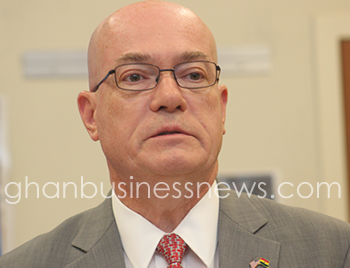US supports regional training centre to combat transnational crimes

Mr Robert Porter Jackson United States of America’s Ambassador to Ghana, says the United States is committed and will continue to partner Ghana, and West Africa, to combat transnational crimes, including human trafficking.
He said human trafficking, especially of children and women was a major problem in Ghana, and one of the priority areas of concern for the West Africa Regional Training Centre (WARTC).
Speaking during an interview at the opening of the new WARTC premises in Accra, Mr Jackson said there was a misconception about trafficking in Ghana, where it was normal for children to help their families in some economic activities.
“…when children are essentially sold by their families and forced into dangerous work; diving into lakes, getting caught in nets, drowning or working machinery and getting ghastly diseases; that’s trafficking and that’s what we’re trying to solve,” he said.
“We estimate that there are about 100,000 children involved in those two industries, doing very dangerous work,” he added, noting that another big concern was the incidence of women, primarily and also some men, being trafficked to the Middle East, where they were forced into prostitution.”
Mr Jackson said the US through the WARTC had been working with government to address these, and commended the new government for its engagement and commitment to fight this crime, saying there had been more prosecutions and investigations; a trend which he hoped will continue.
The WARTC, which was established in 2012, following the signing of a Memorandum of Understanding between the governments of Ghana and the United States, is a training facility focused on combating transnational organised crime and criminal justice capacity building for ECOWAS member states.
The facility, which was previously housed in the Marvel House, has so far trained about 4000 participants from 35 African Countries including 1,529 Ghanaians from institutions including the Ghana Police Service, Immigration Service, Financial Intelligence Centre, Narcotics Control Board and the Attorney General’s Department.
Mr Jackson said this high number of Ghanaian participants showed Ghana’s commitment to the Centre and commended government for the continued collaboration.
“What happens in Africa matters, the challenges you face here reverberate around the globe. They affect our mutual security and by extension, our health, our democracy, our trade and our economic growth. That’s why the US government is so committed to ensuring that this regional training centre fulfils its mandate to improve regional security and bolster law enforcement capacity” he stated.
Mr Ambrose Dery, Minister of Interior, said progress was being made in the fight against human trafficking in Ghana with the increased capacity from the RTC training.
This year alone, he noted, 24 children have been released from the Volta Lake and 11 people who had fake certificates were identified and intercepted.
He said the only challenge was that Ghana was on the Tier two watch-list for human trafficking by the US for failing to meet the standards for 2014, 2015 and 2016 but have been working to catch up.
“We’ve had four convictions in late January and early February, the Human Trafficking fund at the Gender Ministry was allocated GH¢500,000 in this year’s budget and have come out with an action plan to combat this,” he stated, adding that it was a work in progress.
Mr Dery emphasised the need for concerted efforts in the fight against transnational crime as the world, including Africa, became a global village, threatened by religious extremism, terrorist financing, human trafficking, proliferation of arms and narcotic crimes among others.
He said the sophistication and illicit wealth amassed by organised crime cartels had made clear that only a concerted effort by the international community can fight them.
He commended the efforts by the United States’ Bureau of International Narcotics and Law Enforcement Affairs (INL) to train personnel in the ECOWAS region to combat transnational crimes through the RTC, of which Ghana had the highest number of beneficiaries.
Mr Dery said Ghana was currently receiving support from the US for the South Human Trafficking Identification and Interdiction system which would improve Ghana’s international ranking.
He also pledged the Ministry’s support to the Personnel Partnership programme proposed by the IMF between the WARTC, the Ministry Of Interior, Ghana Police Service and the National Security Council Secretariat to boost inter-agency cooperation.
The programme, he told the GNA, would allow Ghanaian personnel to learn international best practice and also bring their expertise to bear on efforts by the WARTC to combat transnational crime.
Mr Hayward Lampley, RTC Programme Director, said the Centre would embark on more one-on-one training with the Ghana Police Service, with support from the US Federal Bureau of Investigations, to equip them with the technical know-how to deal with increasingly professional nature of organised crime, especially cyber and internet crime.
He said they would also bring in equipment, computers and other technology to combat such crimes, which would be complemented by training on forensic accounting, and tracing computer records, among others.
Source: GNA
